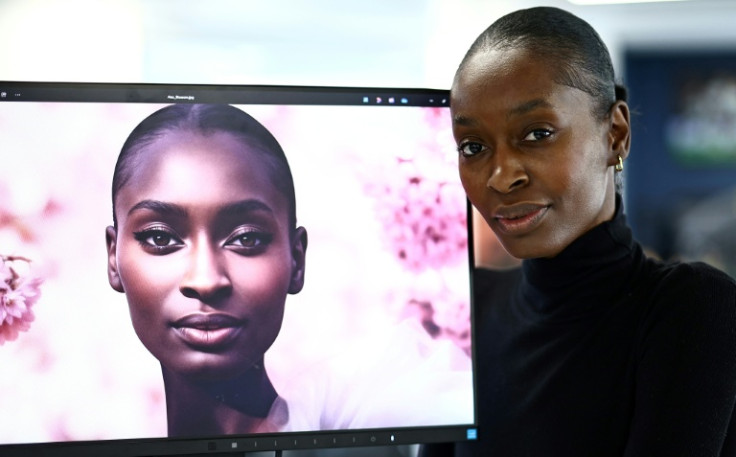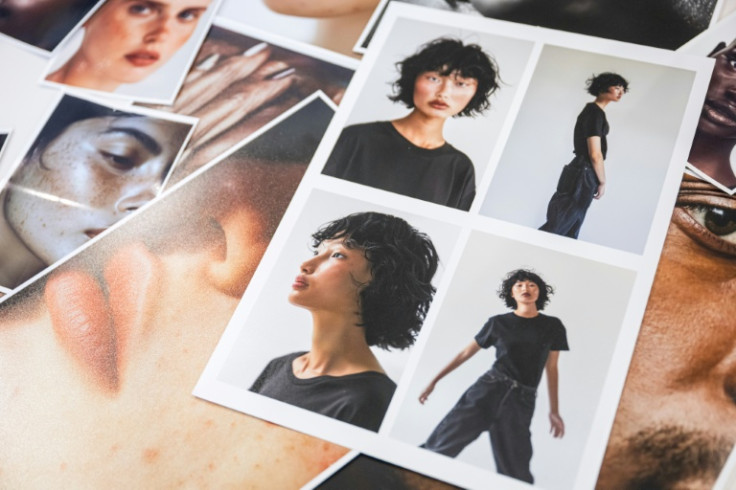AI Opens 'Endless' Doors For Fashion Models, Closes Others

London-based model Alexsandrah Gondora understands the power of being in "two places at the same time" thanks to an AI replica of herself: "She's doing the hard work so I don't have to!"
Fashion designers and retailers can book her digital double for photo shoots without her having to travel or physically be there, Gondora told AFP.
It is a solution that "saves time", said the model, who is also walking down in-person runways at London Fashion Week, which runs until Monday evening.
In the fashion industry, artificial intelligence is already used by brands to create visual imagery for e-commerce websites and customised advertising campaigns at a lower cost.
While the technology opens up opportunities for some, critics fear AI will render many professionals, including models, make-up artists and photographers obsolete -- and could risk promoting an artificial standard of beauty.
In one video, sculpted male models flex their muscles next to glamorous women, with a backdrop of marble pools and gilded mirrors.
But none of it is real: this Christmas campaign was entirely generated with the use of AI by studio Copy Lab for the Swedish underwear brand CDLP.
"We are a very small company: I cannot go to a house in Beverly Hills and shoot a campaign," said CDLP co-founder Christian Larson.
According to Larson, "real" photography has limitations.
"You have a film of this many pictures, the sun will set, and the light will disappear, and the budget will run out," Larson told AFP.
But with AI, "you dive into this black hole of endless options."
Preparing an ad campaign involving a photo shoot in the French Alps for ski eyewear would normally take several months to complete and could cost 35,000 euros ($37,000), but can be done virtually for just 500 euros in a few days, claimed Artem Kupriyanenko, citing a campaign done by his technology company Genera.
London and Lisbon-based Genera boasts a catalogue of 500 AI-generated models, all of which it claims to own the copyrights for.
The avatars can be customised by clients: "We can do any body shape, any gender, any ethnicity," assured Genera's creative head Keiron Birch, who said the practice was "super inclusive".
But AI tends to create a characteristic face type, which differs from generator to generator, said Carl-Axel Wahlstrom, co-founder of Stockholm-based Copy Lab, an "AI creative studio".
MidJourney, for example, has a tendency to generate models with thicker lips.
Generative AI is trained on banks of images of models that are often retouched or which reflect a dominant "white, Western" aesthetic, explained Wahlstrom.
To obtain less generic results, he refines the descriptions or "prompts" he provides to the AI engines.
And for more "authentic" results, he also trains them on "imperfect" databases, where he has, for example, added images of "regular skin, like my skin, my girlfriend's skin, people that we know's skin."
Alexsandrah Gondora was critical of brands which use AI images created from databases found on the internet without paying the model, who she called the "middleman".
Models also face being duplicated virtually without their knowledge.
The "Fashion Workers Act", due to come into force this summer in New York, hopes to tackle this grey area by enabling models to control the use of AI to reproduce their likeness. But its practical application could prove complicated.
Gondora, however, is compensated for the work done by her digital alter ego and has the final say on how it is used.
This is also the case when she helps bring Shudu Gram, an AI-generated black supermodel, to life.
This virtual character created in 2017 and billed as the "world's first digital supermodel" is followed by 237,000 followers on Instagram.
Gondora and several other real-life black models lend their features to various shoots and projects for Shudu.
Last year, Shudu was a model for a 1960s-inspired collaboration by fashion label MAX&Co and London-based designer Richard Quinn.
When used ethically, AI does not deprive models from diverse backgrounds of opportunities, assured Gondora, who claimed that this technology has "opened certain doors" for her.
One of them is that her AI model is "timeless".
"There is no expiration for my AI... it's timeless. Somewhere out there in the world, my AI will always be young to me, even when I'm old."


© Copyright AFP 2025. All rights reserved.





















